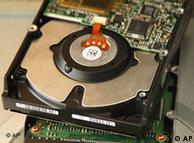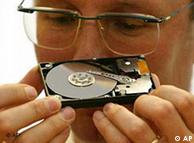Molecule-sized magnets could promise leap for data storage capacity
Scientists in the UK have created a magnet no larger than a molecule
which could vastly expand hard drive storage capacity and allow huge
volumes of data to be stored in tiny places.
Most computer users know the frustration of running out of data
storage space. No matter how big your hard drive, massive files like
high-definition films and large photo collections often end up
cluttering it.
Researchers around the world have long been looking for new
technology to dramatically increase computer memory space, making it
something of a Holy Grail in the industry.
Now, scientists at the University of Nottingham have come up with a
new molecule which could lead to a breakthrough in the search for
boosting computer data storage capacity.
 Today's hard drives are already incredibly small - they could shrink further Today's hard drives are already incredibly small - they could shrink further
Steve Liddle, an expert in molecular depleted uranium chemistry at
the university, points to a glass tube containing a bit of dark blue
material.
It's a tiny fraction of a new molecule which he has created. Each is a
magnet - a so-called single molecule magnet. You can't make a smaller
magnet than that, he adds.
"The difference with a single molecule magnet is that the
magnetization you can get from these molecules derives exclusively from
molecular origin - so it's actually the molecule itself which is
generating the magnetism," said Liddle.
Cramming more into less
Liddle, who published a paper on the subject last month, believes
that a magnet that small could be hugely significant to boosting
computer storage space.
That's because modern computer hard disk drives work magnetically.
The data is stored digitally as tiny magnetized regions, called bits, on
the disk.
The bits are written and read by separate elements in a recording head as it flies over the spinning disk.
"The aim of a manufacturer of a hard disk is to try to get more and
more information onto the disk so that you can store more information in
a smaller space," said Martyn Poliakoff, a chemistry professor at the
University of Nottingham.
Today's hard disk magnets are already incredibly small, just a few
hundred nanometers wide. Yet that is big compared to single molecule
magnets. Using these could increase data storage a thousandfold.
Heat poses a hurdle
But it may be a while before these molecule magnets make their way
into computer hard drives. That's due to something called blocking
temperature, according to Liddle.
"Blocking temperature is the temperature below which the
magnetization that you have is stable - and above this temperature it
scrambles and it loses the information that you have," he explained.
"That would be like having a computer hard drive which on a hot day
would lose all of your data."
To fix that, the molecule's spin state needs to be increased.
 The hunt for the Holy Grail of data storage is heating up The hunt for the Holy Grail of data storage is heating up
That's how many electrons are spinning around the atomic core - the
more the better. Liddle's single molecule magnet is made up of two
uranium atoms.
"We have a compound with two uranium atoms in it, and what we need to
do is build up molecules with many, many uranium atoms in them and that
will build up the spin state and hopefully it should build up the
blocking temperature," said Liddle.
Hunt for the Holy Grail
But, he admits, once his team is able to get around the blocking
temperature, it might take a few more years at least before computer
hard drives become a thousand times larger than the terabyte drives
currently available.
"The next step is then to get them into systems which could actually
be used in a hard drive and to then find out whether they are actually
any good from a technological standpoint," said Liddle.
But computer storage technology develops fast, and magnets could be
made redundant by solutions like flash drive technology, which you
already find in smartphones and more and more laptop computers.
For now, magnetic hard drives are cheaper and bigger but they're
approaching the limit of how small usable magnets can be, and therefore
how much data can be stored in a certain space.
It means the hunt for the Holy Grail of data storage is heating up, and with that - hopefully - speeding up too.
Author: Lars Bevanger / sp
Editor: Martin Kuebler magnet http://www.dw-world.de/dw/article/0,,15090061,00.html
| 








